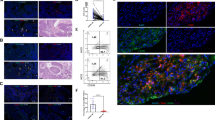Abstract
Tumor-associated macrophages (TAMs) have been implicated in promoting tumor progression. Nowadays, adenocarcinoma has surpassed squamous cell carcinoma as the most frequent type of lung cancer, but in lung adenocarcinoma, the correlation of TAMs with lymphangiogenesis patients remains unclear. The aim of this study was to examine the relationship between TAMs and lymphangiogenesis and the lung adenocarcinoma patients’ prognosis. Tumor specimens from 65 patients with lung adenocarcinoma were determined for TAMs count and lymphatic microvessel density (LMVD) by immunohistochemistry. A positive correlation existed between TAMs count and D2-40-positive peritumoral LMVD (r = 0.069, P < 0.001). TAMs infiltration was significantly associated with P-TNM staging (P = 0.042) and lymph node metastasis (P = 0.037), and peritumoral LMVD was correlated with lymph node metastasis (P = 0.003). A significant difference in overall survival was detected not only between tumors with a high TAMs count and a low TAMs count (P = 0.009) but also between tumors with a high peritumoral LMVD and a low peritumoral LMVD (P = 0.005). Both TAMs count and peritumoral LMVD were independent prognostic factors for overall survival. Our results indicate that TAMs infiltration correlates with tumor lymphangiogenesis and poor survival in lung adenocarcinoma.


Similar content being viewed by others
References
Tiseo M, Bartolotti M, Gelsomino F, Ardizzoni A. First-line treatment in advanced non-small-cell lung cancer: the emerging role of the histologic subtype. Expert Rev Anticancer Ther. 2009;9:425–35.
de Visser KE, Coussens LM. The inflammatory tumor microenvironment and its impact on cancer development. Contrib Microbiol. 2006;13:118–37.
Solinas G, Germano G, Mantovani A, Allavena P. Tumor-associated macrophages (TAM) as major players of the cancer-related inflammation. J Leukoc Biol. 2009;86:1065–73.
Lewis CE, Pollard JW. Distinct role of macrophages in different tumor microenvironments. Cancer Res. 2006;66:605–12.
Porta C, Subhra Kumar B, Larghi P, Rubino L, Mancino A, et al. Tumor promotion by tumor-associated macrophages. Adv Exp Med Biol. 2007;604:67–86.
Allavena P, Sica A, Solinas G, Porta C, Mantovani A. The inflammatory micro-environment in tumor progression: the role of tumor-associated macrophages. Crit Rev Oncol Hematol. 2008;66:1–9.
Mantovani A. La mala educación of tumor-associated macrophages: diverse pathways and new players. Cancer Cell. 2010;17:111–2.
Takanami I, Takeuchi K, Kodaira S. Tumor-associated macrophage infiltration in pulmonary adenocarcinoma: association with angiogenesis and poor prognosis. Oncology. 1999;57:138–42.
Shieh YS, Hung YJ, Hsieh CB, Chen JS, Chou KC, et al. Tumor-associated macrophage correlated with angiogenesis and progression of mucoepidermoid carcinoma of salivary glands. Ann Surg Oncol. 2009;16:751–60.
Ryder M, Ghossein RA, Ricarte-Filho JC, Knauf JA, Fagin JA. Increased density of tumor-associated macrophages is associated with decreased survival in advanced thyroid cancer. Endocr Relat Cancer. 2008;15:1069–74.
Lee CH, Espinosa I, Vrijaldenhoven S, Subramanian S, Montgomery KD, et al. Prognostic significance of macrophage infiltration in leiomyosarcomas. Clin Cancer Res. 2008;14:1423–30.
Stacker SA, Farnsworth RH, Karnezis T, Shayan R, Smith DP, et al. Molecular pathways for lymphangiogenesis and their role in human disease. Novartis Found Symp. 2007;281:38–43.
Kim HS, Sung W, Lee S, Chang SG, Park YK. Lymphatic vessel densities of lymph node-negative prostate adenocarcinoma in Korea. Pathol Res Pract. 2009;205:249–54.
Schoppmann SF, Birner P, Stöckl J, Kalt R, Ullrich R, et al. Tumor-associated macrophages express lymphatic endothelial growth factors and are related to peritumoral lymphangiogenesis. Am J Pathol. 2002;161:947–56.
Schoppmann SF, Fenzl A, Nagy K, Unger S, Bayer G, et al. VEGF-C expressing tumor-associated macrophages in lymph node positive breast cancer: impact on lymphangiogenesis and survival. Surgery. 2006;139:839–46.
Zhang B, Wang J, Gao J, Guo Y, Chen X, et al. Alternatively activated RAW264.7 macrophages enhance tumor lymphangiogenesis in mouse lung adenocarcinoma. J Cell Biochem. 2009;107:134–43.
Deniz H, Kibar Y, Güldür ME, Bakir K. Is D2–40 a useful marker for distinguishing malignant mesothelioma from pulmonary adenocarcinoma and benign mesothelial proliferations? Pathol Res Pract. 2009;205:749–52.
Pepper MS. Lymphangiogenesis and tumor metastasis: myth or reality? Clin Cancer Res. 2001;7:462–8.
Mandriota SJ, Jussila L, Jeltsch M, Compagni A, Baetens D, et al. Vascular endothelial growth factor-C-mediated lymphangiogenesis promotes tumour metastasis. EMBO J. 2001;20:672–82.
Stacker SA, Caesar C, Baldwin ME, Thornton GE, Williams RA, et al. Vascular endothelial growth factor-D promotes the metastatic spread of cancer via the lymphatics. Nature Med. 2001;7:186–91.
Edwards JP, Zhang X, Frauwirth KA, Mosser DM. Biochemical and functional characterization of three activated macrophage populations. J Leukoc Biol. 2006;80:1298–307.
Martinez FO, Sica A, Mantovani A, Locati M. Macrophage activation and polarization. Front Biosci. 2008;13:453–61.
Kojima H, Shijubo N, Yamada G, Ichimiya S, Abe S, et al. Clinical significance of vascular endothelial growth factor-C and vascular endothelial growth factor receptor 3 in patients with T1 lung adenocarcinoma. Cancer. 2005;104:1668–77.
Renyi-Vamos F, Tovari J, Fillinger J, Timar J, Paku S, et al. Lymphangiogenesis correlates with lymph node metastasis, prognosis, and angiogenic phenotype in human non-small cell lung cancer. Clin Cancer Res. 2005;11:7344–53.
Kadota K, Huang CL, Liu D, Ueno M, Kushida Y, et al. The clinical significance of lymphangiogenesis and angiogenesis in non-small cell lung cancer patients. Eur J Cancer. 2008;44:1057–67.
Acknowledgments
We thank Shousong Chen (Department of Pathology, Wuhan General Hospital of Guangzhou Command, People’s Liberation Army, Wuhan, China) for her excellent technical assistance. This study was supported by Medical Scientific Research Foundation of Hubei Province, China (Number: JX3B37).
Author information
Authors and Affiliations
Corresponding author
Additional information
B. C. Zhang and J. Gao contributed equally to this study.
Rights and permissions
About this article
Cite this article
Zhang, B.C., Gao, J., Wang, J. et al. Tumor-associated macrophages infiltration is associated with peritumoral lymphangiogenesis and poor prognosis in lung adenocarcinoma. Med Oncol 28, 1447–1452 (2011). https://doi.org/10.1007/s12032-010-9638-5
Received:
Accepted:
Published:
Issue Date:
DOI: https://doi.org/10.1007/s12032-010-9638-5




